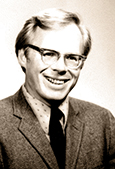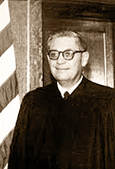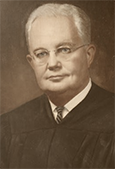2019 Inductees
Heritage of Leadership
Joseph R. Julin (1926-1993)

Joseph Julin attended Northwestern University, earning his LL.B. degree in 1952. During law school, he served as class president and associate editor of the Law Review and was elected to Order of the Coif. After graduation, he entered private practice in Chicago. In 1959, he joined the faculty at the University of Michigan Law School, where he served as Associate Dean.
In 1971, Julin moved to Gainesville to begin his tenure as dean of UF Law. Under his leadership, the school’s national prominence increased significantly. Julin led the establishment of the Graduate Tax Program, bolstered the Legal Information Center’s innovations in electronic research, recruited new faculty, and provided support to student and faculty to participate in international programs.
After stepping down as Dean in 1980, Julin served as president of the National Conference of Bar Examiners, president of the Association of American Law Schools, and chair of the ABA Section of Legal Education and Admissions. As Special Master to the United States District Court for the Middle District of Florida, he resolved decades-long litigation through a creative solution to correct deficiencies in Florida’s state prisons. From 1985 until his death in 1993, Julin held the role of Chesterfield Smith Professor of Law.
Isaac Benjamin Krentzman, Jr. (1914-1998)

Class of 1938
Ben Krentzman received his B.S. degree from the University of Florida in 1935, where he excelled both as a student and a leader. He remained in Gainesville to attend UF Law, earning his law degree in 1938 and serving as Florida Blue Key President.
Krentzman joined the Army in 1941, achieving the rank of lieutenant colonel and earning a Bronze Star for his combat service in WWII. After his discharge in 1946, he returned to Clearwater to continue a legal career that would span the next 50 years. He founded a small law firm before serving as city attorney for Largo and Clearwater. He was also elected president of the Clearwater Bar Association and served on the Board of Governors of The Florida Bar.
In 1967, Krentzman was nominated to become a federal judge by Senator George Smathers and was appointed to the U.S. District Court for the Middle District of Florida by President Lyndon B. Johnson. Among the many high-profile cases Krentzman presided over was the Supreme Court’s desegregation mandate imposing court-ordered busing in the 1960s and 1970s. Krentzman later served as Chief Judge of the Middle District of Florida and assumed Senior Status in 1982. He remained on the court until his death in 1998.
William A. McRae, Jr. (1909-1973)

Class of 1933
William McRae earned his law degree from the University of Florida in 1933 before becoming a Rhodes Scholar at Oxford University. He practiced law in Jacksonville prior to joining the Army, where he served as a colonel in WWII and an adviser to the Joint Chiefs of Staff during the drafting of the United Nations Charter. Upon his return, he became a professor at UF Law and served as chairman of the university’s Board of Trustees and as president of The Florida Bar.
In 1961, McRae became the first federal judge appointed by President John F. Kennedy. He was later reassigned from the U.S. District Court for the Southern District of Florida to a new seat on the Middle District of Florida. He was named Chief Judge in 1971.
During his 12 years on the bench, McRae made many key decisions, including a ruling that the Duval County School Board’s plan for complying with the Supreme Court’s desegregation mandate was insufficient. He wrote his own controversial plan for pairing schools to ensure compliance.
Other historic rulings included ordering the state’s disorderly conduct statute unconstitutional, throwing out portions of Florida’s obscenity law, and freeing hundreds of prisoners on the grounds they had been convicted without the benefit of counsel.
